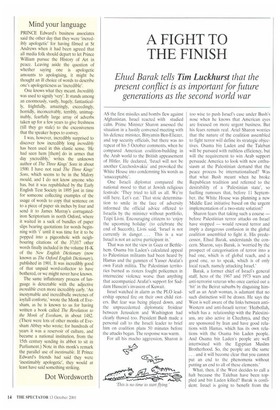Mind your language
PRINCE Edward's business associates said the other day that they were 'incredibly apologetic' for having filmed at St Andrews when it had been agreed that all media folk should depart to let Prince William pursue the History of Art in peace. Leaving aside the question of whether saying one is apologetic amounts to apologising, it might be thought an ill choice of words to describe one's apologeticness as 'incredible'.
One knows what they meant. Incredibly was used to signify 'very'. It stands among an enormously, vastly, hugely, fantastically, frightfully, amazingly, exceedingly, horridly, inconceivably, terribly, unimaginably, fearfully large array of adverbs taken up for a few years to give freshness (till they go stale) to the excessiveness that the speaker hopes to convey.
I was, however, incredibly surprised to discover how incredibly long incredibly has been used in this elastic sense. 'He had seen hem [them] do in arrnes that day yncredibly,' writes the unknown author of The Three Kings' Sons in about 1500. I have not read The Three Kings' Sons, which seems to be in the Mabry mould, and I do not know anyone who has, but it was republished by the Early English Text Society in 1895 just in time for someone collecting examples of the usage of words to copy that sentence on to a piece of paper six inches by four and send it to James Murray's corrugatediron Scriptorium in north Oxford, where it waited in a sack of bundles of paper slips bearing quotations for words beginning with T until it was time for it to be popped into a pigeonhole with neighbouring citations of the 37,017 other words finally included in the volume H–K of the New English Dictionary (now known as The Oxford English Dictionary), published in 1901. It was incredibly good of that unpaid word-collector to have bothered, or we might never have known.
The same inflationary process of language is detectable with the adjective incredible even more incredibly early. 'An inestymable and incredibulle swetenes of ioyfull conforte,' wrote the Monk of Evesham, as he is known to us for having written a book called The Revelation to the Monk of Evesham, in about 1482. (There were lots of other monks of Evesham Abbey who wrote; for hundreds of years it was a reservoir of culture, and became a national institution, from the 15th century sending its abbot to sit in Parliament.) Note in this monk's remark the parallel use of inestimable. If Prince Edward's friends had said they were 'inestimably apologetic', they would at least have said something striking.
Dot Wordsworth


























































































 Previous page
Previous page